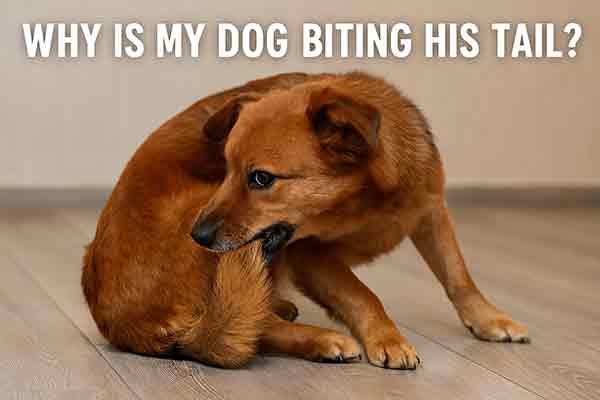Why Is My Dog Biting His Tail? Causes, Solutions & When to See a Vet
Table of Contents
- Introduction
- Common Reasons Dogs Bite Their Tails
- Parasites: Fleas, Ticks, and Mites
- Allergies and Skin Irritation
- Anal Gland Problems
- Injuries and Infections
- Behavioral Causes: Stress and Boredom
- Compulsive Behavior Disorders
- When to See a Vet
- Home Remedies and Prevention Tips
- FAQ
- Conclusion
Introduction
It’s not unusual to see a dog chase or nibble at their tail occasionally. But if you find yourself asking, “Why is my dog biting his tail?” frequently, it could signal an underlying issue. From simple itchiness to medical or behavioral problems, tail biting can be a warning sign that shouldn’t be ignored. Let’s explore the potential causes and how you can help your dog find relief.
Common Reasons Dogs Bite Their Tails
There are many reasons your dog might be biting his tail. Some are physical, such as parasites or allergies, while others are emotional, like stress or boredom. Understanding the root cause is the first step to providing effective help.
Parasites: Fleas, Ticks, and Mites
One of the most common reasons for tail biting is external parasites:
- Fleas: Dogs allergic to flea saliva may experience intense itching and bite their tails for relief.
- Ticks: These can attach near the tail area, causing irritation and discomfort.
- Mites: Mange caused by mites can lead to severe skin irritation and compulsive biting.
Routine parasite prevention is crucial to avoid these problems.
Allergies and Skin Irritation
Dogs can develop allergies to food, pollen, dust, or chemicals, leading to itchy skin. The tail base is often a hotspot for allergic reactions. Look for signs like redness, swelling, or hair loss around the tail area.
Anal Gland Problems
Dogs have two small glands near their anus that can become impacted or infected. Symptoms include:
- Scooting on the floor
- Licking or biting near the tail and rear end
- Swelling or a foul smell
Anal gland issues require veterinary treatment to prevent abscesses and severe discomfort.
Injuries and Infections
Minor injuries, cuts, or infections around the tail can trigger persistent biting. Dogs may also react to foreign objects like burrs or embedded splinters. If the skin looks broken, inflamed, or produces discharge, prompt veterinary care is needed.
Behavioral Causes: Stress and Boredom
Sometimes, tail biting has less to do with physical discomfort and more with emotional needs:
- Boredom: Lack of stimulation can lead dogs to create their own entertainment.
- Stress or anxiety: Changes at home, loud noises, or separation anxiety can trigger obsessive behaviors.
Increasing exercise, mental enrichment, and maintaining a routine can help reduce anxiety-driven tail biting.
Compulsive Behavior Disorders
In severe cases, dogs may develop compulsive disorders similar to OCD in humans. Tail biting becomes a coping mechanism for underlying psychological stress. Treatment usually involves a combination of behavior modification and, in some cases, medication prescribed by a veterinarian.
When to See a Vet
While occasional tail nibbling isn’t usually serious, seek veterinary advice if you notice:
- Persistent or aggressive tail biting
- Bleeding, swelling, or open wounds
- Signs of infection (pus, bad odor)
- Changes in appetite, energy, or behavior
Early intervention can prevent minor issues from becoming major health problems.
Home Remedies and Prevention Tips
Here’s how you can help manage mild cases at home:
- Use flea and tick preventatives year-round
- Feed a balanced, hypoallergenic diet if allergies are suspected
- Keep your dog mentally and physically stimulated
- Groom regularly to check for skin issues
- Use vet-approved soothing sprays for itchy skin
Always consult your vet before starting new treatments.
FAQ
Is it normal for dogs to bite their tails?
Occasional tail chasing or nibbling is normal play behavior. Persistent or aggressive biting is usually a sign of an underlying issue.
Can tail biting cause serious harm?
Yes. Constant biting can lead to skin infections, open wounds, and even permanent tail damage if left untreated.
Should I let my dog chase and bite his tail?
It’s okay during play, but excessive tail chasing and biting should be discouraged and investigated.
How can I stop my dog from biting his tail?
Identify and treat the underlying cause. Use distraction techniques, enrichment toys, and seek veterinary advice if needed.
Can diet changes help with tail biting?
Yes. Switching to a hypoallergenic or limited ingredient diet can help if food allergies are contributing to skin irritation.
Conclusion
Why is my dog biting his tail? It could be anything from fleas to frustration. Identifying the root cause is essential to providing relief and preventing future problems. Whether the issue is medical, behavioral, or a combination of both, early attention ensures your dog stays healthy, comfortable, and happy.
For more pet health advice and behavior tips, browse our blog and stay informed about your dog’s well-being.







